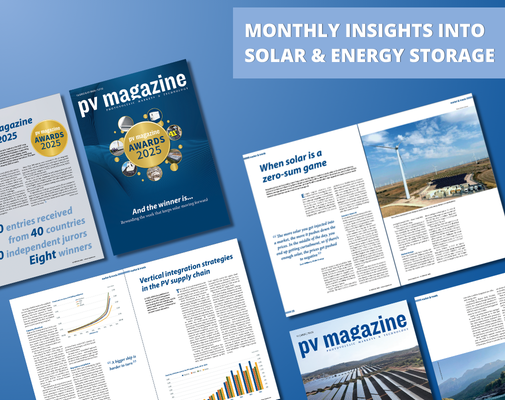Top News
Adani Green Energy rated BBB+ with stable outlook by JCR
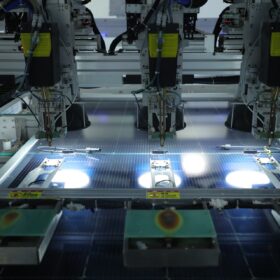
SAEL Group solar SPVs assigned higher ratings by Crisil
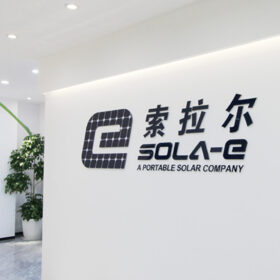
Chinese startup claims record-breaking 27.87% efficiency for single-junction perovskite solar cell
Your monthly PV industry update
pv magazine’s global monthly edition offers authoritative reporting, market-driven analysis, and expert perspectives on the technologies, policies, and investments transforming global power systems. Essential reading for professionals navigating a fast-changing energy landscape.
Available in print and digital
SunRise Arabia Clean Energy Conference 2026
Join the 3rd SunRise Arabia Clean Energy Conference on April 22, 2026, in Riyadh to explore how solar PV and energy storage are powering the Kingdom’s growing digital economy — including data centers. Secure your spot at the early-bird rate.
Battery Business & Development Forum 2026
Connect with Europe’s energy storage leaders at the Battery Business & Development Forum 2026 in Frankfurt (March 31–April 1) and gain insights into evolving business models, financing strategies, and market trends
Out now - pv magazine Global Winter Edition
The new pv magazine Global edition is out now!
Available in print and digital – get your copy today!
pv magazine Webinar
pv magazine Webinar
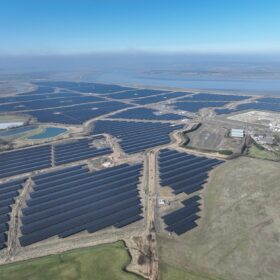
UK added 2.6 GW of solar in 2025, record year for rooftop
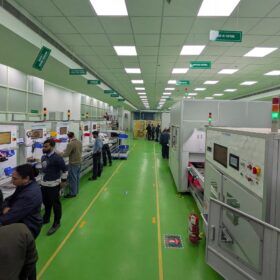
Luminous Power inaugurates 500 MWh lithium-ion battery assembly line at Baddi facility
Sunsure Energy’s Chitrakoot solar plant to supply power to Max Hospital, Noida
China adds 315 GW of solar in 2025
KPI Green Energy commences power supply from 200 MW AC solar project in Gujarat
Markets & Policy
Featured
EV Financing 2.0: Building the Financial Backbone of India’s Green Mobility Ecosystem
Stäubli expands Indian manufacturing footprint with $10 million PV connector investment
Swiss electrical connector manufacturer Stäubli has invested $10 million to expand its manufacturing facility in Bangalore, strengthening its presence in India’s fast-growing solar PV market. The expanded site will produce MC4-Evo1 and MC4-Evo2 connectors using fully automated assembly lines to support domestic and global demand.
U.S. authorities find no definitive evidence of hidden devices in Chinese solar inverters
New documents reveal US government found only two cases of communications in Chinese inverters that differed from official documentation. The discrepancies were deemed “non-malicious” and “non-intentional” by investigators.
Electrolyser selection and balance-of-plant engineering for renewable integrated hydrogen projects
Green hydrogen will scale not through isolated technology breakthroughs, but through disciplined engineering execution. Projects that embed electrolysers within robust, flexible, and future-ready Balance-of-Plant architectures will define the next phase of industrial decarbonisation and renewable energy integration worldwide.
Analysts warn of possible, sudden silver price fall
pv magazine has spoken with silver analysts from Bloomberg and StoneX about the vertiginous growth of silver prices in recent weeks. They both agree that when prices rise too fast, investors’ behavior may change quickly. Meanwhile, the price of the precious metal has reached another all-time high today at $110 per ounce.
India requires $145 billion in annual energy investment to bridge growth and climate targets
India must mobilise around $145 billion in annual energy investment to sustain economic growth while pushing its net-zero ambitions. The bulk of this capital will be directed toward scaling up renewable power generation, grid infrastructure modernization, and energy storage, according to Wood Mackenzie.
Installations
Featured
Carbon steel pipes: The backbone of India’s expanding energy and infrastructure grid
NextPower Arabia to supply 2.25 GW of smart trackers to L&T for Bisha solar project
The newly formed NextPower Arabia joint venture has secured an order to supply 2.25 GWp of advanced solar tracking systems for Saudi Arabia’s Bisha solar project, which is being developed by an ACWA Power–led consortium, with Larsen & Toubro (L&T) serving as the execution partner.
REIL tenders 17.5 MW rooftop solar across government buildings in India
Rajasthan Electronics & Instruments Limited (REIL) has invited bids for the installation of 17.5 MWp of grid-connected rooftop solar power capacity under RESCO model across government, semi-government, and autonomous body buildings in multiple Indian states and union territories.
Kosol Energie signs 360 MW Hoymiles microinverter deal for Andhra Pradesh residential rooftop solar projects
Kosol Energie has finalized a 360 MW microinverter supply agreement with Hoymiles Power Electronics Inc. for residential rooftop solar projects to be deployed across Andhra Pradesh.
Renewable energy industry’s key expectations from Union Budget 2026
The upcoming budget must prioritize in-house technology and equipment development, provide clarity on delayed power purchase agreements (PPAs) and power sale agreements (PSAs), increase budgetary allocation and policy support for Green Energy Corridors, introduce production-linked incentives for battery energy storage system (BESS) manufacturing, establish an Approved List of BESS Integrators (ALBI), lower the cost of capital through priority sector lending, extend ALMM for solar cells, and continue the ISTS waiver, among other measures.
India–EU FTA anchors climate and trade in a fracturing global order
The India–EU free trade agreement is emerging as a platform for climate-trade convergence. The climate dimension is not incidental—it’s already embedded in ongoing India–EU frameworks.
Technology
Featured
India curtailed 2.3 TWh of solar generation between May and Dec. 2025: Ember
Pre-Budget 2026: Solar and storage industry calls for tax reforms, PLI expansion, and circular economy push
Ahead of the presentation of the Union Budget 2026–27, stakeholders across India’s solar and energy storage ecosystem have urged the government to focus on tax reforms, expansion of production-linked incentive (PLI) schemes with targeted allocations, faster viability gap funding (VGF) disbursements, additional funding for residential rooftop solar, improved access to long-term and affordable green finance, and a stronger push for circular economy initiatives and grid modernisation.
Building responsibly: India’s steel sector and the carbon budget challenge
India’s steel sector stands at a decisive moment. As the country pursues industrial growth, it must also demonstrate that development and decarbonisation can move together. The carbon budget framework offers not a constraint, but a compass, guiding industry toward innovation, resilience and global competitiveness.
India’s transition to green steel is expected to be gradual, driven by renewables in the near term: ICRA
ICRA expects the Indian steel industry’s decarbonization to be gradual, with near-term emission reductions driven mainly by higher adoption of renewable energy and improvements in operational efficiency, as high costs and technology constraints limit faster decarbonization.
Chinese scientists build 31.13%-efficient perovskite-silicon tandem solar cell via 2D seeding agent
Researchers in China developed a novel two dimensional (2D) seeding agent to regulate crystallization in a 1.80-eV wide-bandgap perovskite film. A perovskite-silicon tandem device made with the resulting optimized subcell achieved an efficiency of 31.13%, outperforming a control device.
New Delhi to host Bharat Electricity Summit 2026 from 19–22 March
The four-day Summit will focus on the entire power value chain, including power generation (with emphasis on clean energy systems such as solar, wind, hydro, green hydrogen, etc.), transmission and distribution, energy storage, and energy efficiency solutions.
Manufacturing
Featured
Oswal Greenzo Energies secures India’s first port-based 5 MW green hydrogen project at Deendayal Port, Kandla
Scientists design low-cost sodium-ion battery with cheap electrode materials
Conceived for stationary energy storage, the proposed sodium-ion battery configuration relies on an P2-type cathode material and an hard carbon anode material that reportedly ensure full-cell performance. Electrochemical testing revealed initial capacities of 200 mAh/g for the cathode and 360 mAh/g for the anode with capacity retentions of 42% and 67.4% after 100 cycles.
China TOPCon solar module prices climb over 30% since mid-December
In a new weekly update for pv magazine, OPIS, a Dow Jones company, provides a quick look at the main price trends in the global PV industry.
China PV module prices expected to hit $0.12/W in H2
China’s PV module prices are expected to hover around $0.12/W in the second half of 2026 as the removal of export VAT rebates, front-loaded demand, and persistent oversupply keep market sentiment volatile.
‘An immediate transition to copper is technically and economically feasible’
With silver prices rising, more large solar manufacturers are expected to switch to copper for cell metallization. Radovan Kopecek of ISC Konstanz tells pv magazine that he expects the entire industry to follow. Ning Song of the University of New South Wales says a small efficiency tradeoff may be acceptable if the cost savings are significant and do not introduce new reliability risks.
Why end-to-end solar manufacturing is India’s competitive edge
End-to-end solar manufacturing is the bridge that will reduce import reliance, stabilize costs, strengthen supply chains, support exports, and help India move confidently toward its 500 GW renewable energy goal. With the right investments and a continued focus on innovation, India is positioned not just to participate in the solar revolution, but to help shape it.
Energy Storage
Featured
EU installs 27.1 GWh of battery storage in 2025 as utility scale leads
World’s largest compressed-air storage plant switched on in China
New 2.4 GWh adiabatic compressed air energy storage (CAES) plant now operational in in Jiangsu province. The large-scale CAES uses molten salt and pressurized thermal water storage to achieve high efficiency, with power generated through two 300 MW units.
Juniper Green Energy fully commissions India’s first merchant battery energy storage system
Of the 100 MWh battery energy storage system (BESS), 60 MWh was commissioned in Dec. 2025 and the remaining 40 MWh on Jan. 23, 2026.
IndiGrid raises INR 1,500 crore through institutional placement
India’s first and largest publicly listed power sector Infrastructure Investment Trust (InvIT), IndiGrid, has successfully raised INR 1,500 crore through an institutional placement (IP). The placement was oversubscribed by around two times and saw strong participation from both domestic and global institutional investors.
China completes first full-scale underwater pumped storage trial at 65 m depth
DEC’s “Dongchu No. 1” prototype completed more than 100 charge-discharge cycles at 65 meters depth in a freshwater lake.
Indian startup Meine Electric raises $750,000 for iron–air long-duration energy storage
Indian energy storage startup Meine Electric has raised $750,000 (INR 6.7 crore) in a pre-seed funding round to support its transition from laboratory-scale prototypes to pilot-ready iron–air battery systems.
Opinion & Analysis
Featured
European PV market faces potential 2026 price shock from China export tax
Why India’s digital future will be built at the edge
The centralized cloud model is now under strain. India alone is estimated to have reached roughly 2,070 MW of data center capacity by the end of 2025, up from about 1,255 MW in 2024, driven by AI adoption, 5G rollout, and video led consumption, even as power, land, and network constraints become more visible. At the same time, global data center markets are grappling with power constraints, rising energy costs, and land limitations, making the continued expansion of a few large hubs increasingly inefficient.
Energy storage for homes: Why hybrid inverter systems will lead the next phase of solar growth
Energy storage for homes—anchored by hybrid inverter systems—will lead the next phase of solar growth in India. Not as an upgrade, but as a necessity for a nation building toward energy independence by 2047.
Australia betting on new ‘strategic reserve’ to loosen China’s grip on critical minerals
The federal government has unveiled new details of its plan to create a $1.2 billion critical mineral reserve. Three minerals will initially be the focus: antimony, gallium and rare earths (a group of 17 different elements).
Solar modules under pressure: The growing risk of spontaneous glass breakage
Once considered isolated incidents, spontaneous glass breakages in solar modules are becoming more frequent, highlighting the limits of some manufacturing choices and the need for closer quality control.
Compliance premiums lift global polysilicon prices
In a new weekly update for pv magazine, OPIS, a Dow Jones company, provides a quick look at the main price trends in the global PV industry.
